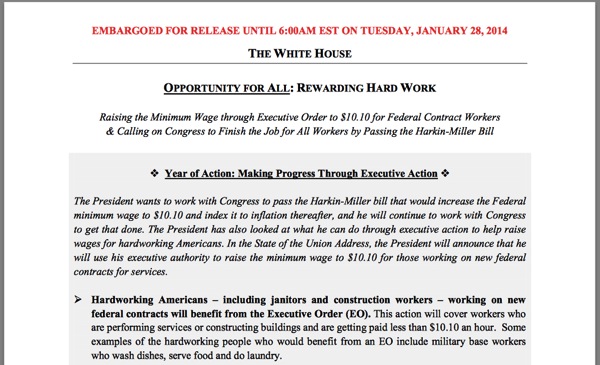Last night in his State of the Union address, President Obama made a variety of statements about the state of the economy and public policy. We want to highlight a few ideas that the President put on the table that, according to serious economic research, will both address inequality and benefit the economy.
—
“But average wages have barely budged. Inequality has deepened. Upward mobility has stalled”
- Inequality has certainly deepened. According to data from Emmanuel Saez, an Equitable Growth Steering Committee member, and Thomas Piketty, the share of income going to the top 1 percent of earners increase from about 8 percent in 1979 to approximately 19 percent in 2012. At the same time, recent research by Equitable Growth Steering Committee members Raj Chetty and Saez has shown that economic mobility in the United States has stayed constant for the last several decades. However, there is a tremendous variation in opportunity across regions in the country. The research by Chetty, Saez, and their coauthors can be found at the Equality of Opportunity Project.
“I’m also convinced we can help Americans return to the workforce faster by reforming unemployment insurance so that it’s more effective in today’s economy. But first, this Congress needs to restore the unemployment insurance you just let expire for 1.6 million people.”
- Not extending emergency unemployment benefits for long-term unemployed workers would allow millions of workers to become totally disconnected from the labor force. The result would be inequitable and hurt economic growth. Research by the Congressional Budget Office and the Department of Labor and the Council of Economic Advisers found that extending these UI benefits would raise employment and output in 2014.
“Research shows that one of the best investments we can make in a child’s life is high-quality early education.”
- Here’s some of the research on early education, including work by Nobel Laureate James Heckman. Early childhood education has long term effects such as gains in employment, later schooling, and earnings.
“Today, the federal minimum wage is worth about twenty percent less than it was when Ronald Reagan first stood here. Tom Harkin and George Miller have a bill to fix that by lifting the minimum wage to $10.10.”
- The President supports the raising the minimum wage to $10.10 an hour. For those interested in the economics of such an increase or other topics related to the minimum wage, check out our researcher profile of Equitable Growth Research Advisory Board member Arin Dube
“There are other steps we can take to help families make ends meet, and few are more effective at reducing inequality and helping families pull themselves up through hard work than the Earned Income Tax Credit. Right now, it helps about half of all parents at some point. But I agree with Republicans like Senator Rubio that it doesn’t do enough for single workers who don’t have kids. So let’s work together to strengthen the credit, reward work, and help more Americans get ahead.”
- A higher minimum wage and a more generous Earned Income Tax Credit would be an effective combination of policies. Research by Equitable Growth Research Advisory Board member Jesse Rothstein has shown that employers capture 27 percent of the value of the EITC. A higher minimum wage could help counteract that capture. A larger EITC would get more workers into the labor force and a higher minimum wage would insure they were properly rewarded for their work.
“Today, women make up about half our workforce. But they still make 77 cents for every dollar a man earns. That is wrong, and in 2014, it’s an embarrassment. A woman deserves equal pay for equal work. She deserves to have a baby without sacrificing her job. A mother deserves a day off to care for a sick child or sick parent without running into hardship – and you know what, a father does, too. It’s time to do away with workplace policies that belong in a “Mad Men” episode. This year, let’s all come together – Congress, the White House, and businesses from Wall Street to Main Street – to give every woman the opportunity she deserves. Because I firmly believe when women succeed, America succeeds.”
- A wide range of research finds that policies to help women full achieve their potential would have large benefits for our economy. Policies could help boost labor force participation, increase productivity, and boost our Gross Domestic Product by about 3 percent.
“A pre-existing condition used to mean that someone like Amanda Shelley, a physician assistant and single mom from Arizona, couldn’t get health insurance. But on January 1st, she got covered. On January 3rd, she felt a sharp pain. On January 6th, she had emergency surgery. Just one week earlier, Amanda said, that surgery would’ve meant bankruptcy.
“That’s what health insurance reform is all about – the peace of mind that if misfortune strikes, you don’t have to lose everything.”
- Work by researchers at the RAND Corporation found that the Affordable Care Act will substantially reduce the financial risks to low income people. The study found that out-of-pocket spending on health care would decrease for all groups considered.
“More than nine million Americans have signed up for private health insurance or Medicaid coverage.”
Research published in Health Affairs by Carter Price and Christine Eibner found that Medicaid expansion will increase coverage, reduce state spending on uncompensated health care costs, and bring more federal spending into the state.

